Lions Clubs International
Lions Clubs International (LCI) is an international non-political service organization established originally in 1917 in Chicago, Illinois, by Melvin Jones.[1] It is now headquartered in Oak Brook, Illinois. As of January 2020, it had over 46,000 local clubs and more than 1.4 million members (including the youth wing Leo) in more than 200 countries around the world.[2]
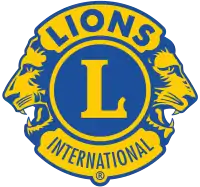 | |
| Motto | "We Serve" |
|---|---|
| Formation | October 10, 1917 |
| Founder | Melvin Jones |
| Type | Service club |
| Headquarters | Oak Brook, Illinois, U.S. |
Membership | 1,400,000 |
President | Jung-Yul Choi |
| Website | Official website |
Introduction
_02.jpg.webp)
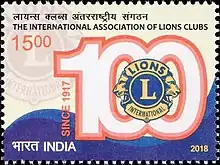
Lions Clubs International was founded in Evansville, Indiana on 24 October 1916 by William Perry Woods and subsequently evolved as an international service organization under the guidance and supervision of its secretary, Melvin Jones.
In 1917, Jones was a 38-year-old Chicago business leader who told members of his local business club they should reach beyond business issues and address the betterment of their communities and the world. Jones' group, the Business Circle of Chicago, agreed. After contacting similar groups around the United States, an organizational meeting was held on June 7, 1917, in Chicago. The Business Circle subsequently joined one of the invited groups, the "International Association of Lions Clubs" and at a national convention held in Dallas, Texas, later that year, those who were assembled: (1) adopted a Constitution, By-Laws, Code of Ethics and an Emblem; (2) established as a main tenet "unselfish service to others", (3) unanimously elected Woods as its first president ,effectively securing his leadership for the first two years of the existence of the International Association of Lions, and (4) selected Jones to serve as the organization's secretary-treasurer.[3]
The Lions motto is "We Serve". Local Lions Club programs include sight conservation, hearing and speech conservation, diabetes awareness, youth outreach, international relations, environmental issues, and many other programs.[4] The discussion of politics and religion is forbidden. The LIONS acronym also stands for Liberty, Intelligence, Our Nations' Safety.[5]
Aims
The stated purposes of Lions Clubs International are:
- To Organize, charter and supervise service clubs to be known as Lions clubs.
- To Coordinate the activities and standardize the administration of Lions clubs.
- To Create and foster a spirit of understanding among the peoples of the world.
- To Promote the principles of good government and good citizenship.
- To Take an active interest in the civic, cultural, social and moral welfare of the community.
- To Unite the clubs in the bonds of friendship, good fellowship and mutual understanding.
- To Provide a forum for the open discussion of all matters of public interest; provided, however, that partisan politics and sectarian religion shall not be debated by club members.
- To Encourage service-minded people to serve their community without personal financial reward, and to encourage efficiency and promote high ethical standards in commerce, industry, professions, public works and private endeavors.[4]
Focus of Lions
Service projects
Lions Clubs plan and participate in a wide variety of service projects that meet the international goals of Lions Clubs International as well as the needs of their local communities. Examples include donations to hospices,[6] or community campaigns such as Message in a bottle, a United Kingdom and Ireland initiative which places a plastic bottle with critical medical information inside the refrigerators of vulnerable people.[7] Money is also raised for international purposes. Some of this is donated in reaction to events such as the 2004 Indian Ocean earthquake and the 2013 Typhoon Haiyan (Yolanda) where Lions and LCIF provided disaster relief locally and from around the world, with donations and commitments surpassing US$1 million.[8] Other money is used to support international campaigns, coordinated by the Lions Clubs International Foundation (LCIF), such as Sight First and Lions World Sight Day, which was launched in 1998 to draw world media attention to the plight of sight loss in the developing world.[9] Lions take on all sorts of various fundraisers to fund these projects.
Lions focus on work for the blind and visually impaired began when Helen Keller addressed the international convention at Cedar Point, Ohio, on 30 June 1925 and charged Lions to be Knights of the Blind.
Lions also have a strong commitment to community hearing- and cancer-screening projects. In Perth, Western Australia, they have conducted hearing screening for over 30 years and provided seed funding for the Lions Ear and Hearing Institute established September 9, 2001, a center of excellence in the diagnosis, management, and research of ear and hearing disorders.[10] In Perth, Lions have also been instrumental in the establishment of the Lions Eye Institute. In Brisbane, Queensland, the Lions Medical Research Foundation provides funding to a number of researchers. Ian Frazer's initial work, leading to the development of a HPV vaccine for the human papillomavirus which could lead to cervical cancer, was funded by the Lions Medical Research Foundation.
Lions Clubs International has supported the work of the United Nations since that organization's inception in 1945, when it was one of the non-governmental organizations invited to assist in the drafting of the United Nations Charter in San Francisco, California.
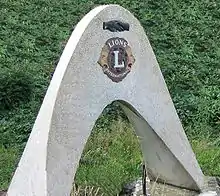
Lions Clubs International Foundation
Lions Clubs International Foundation is "Lions helping Lions serve the world".[11] Donations provide funding in the form of grants to financially assist Lions districts with large-scale humanitarian projects that are too expensive and costly for Lions to finance on their own.[12] The Foundation aids Lions in making a greater impact in their local communities, as well as around the world. Through LCIF, Lions ease pain and suffering and bring healing and hope to people worldwide. Major initiatives of the foundation include the following:
- SightFirst programs
- Childhood Blindness Project
- Lions Eye Health Program (LEHP, pronounced "leap")
- River blindness/Trachoma
- SightFirst China Action
- Sight for Kids
- Other sight programs
- Core 4 Preschool
- Vision Screening
- Disability programs
- Lions World Services for the Blind
- Diabetes Prevention/Treatment
- Habitat for Humanity Partnership
- Lions Affordable Hearing Aid Project
- Low Vision
- Special Olympics Opening Eyes
- Youth Programs
- Highest Club recognitions
- Model Clubs
- 100|100 Clubs
SightFirst
Upon endorsing the biggest ever collaborative disease eradication program called the London Declaration on Neglected Tropical Diseases launched on 30 January 2012 in London, the organization has implemented SightFirst program by which it aims to eradicate blindness due to trachoma, one of the neglected tropical diseases. It has allocated over US$11 million in 10 countries for eye surgeries, medical training, distribution of Zithromax and tetracycline, and sanitary services. It has also announced US$6.9 million funding to support the Government of China for the same cause.[14][15]
Membership
Membership in the Lions Club is by "invitation only" as mandated by its constitution and by-laws. All member applicants need a sponsor who is an active member and of good standing in the club they intend to join. While sponsorship may be obtained by an applicant in order to become a legitimate member, sponsorship is no guarantee of membership. Acceptance of membership is still subject to the approval of the majority of the club's board of directors. A Lions Club chooses its members diligently as it requires time and financial commitments. Prospective applicants must be a person of good moral character in his or her community. Attendance at meetings is encouraged on a monthly or fortnightly basis. Due to the hierarchical nature of Lions Clubs International, members have the opportunity to advance from a local club to an office at the zone, district, multiple district, and international levels.
In 1987 the constitution of Lions Clubs International was amended to allow for women to become members.[16] Since then many clubs have admitted women, but some all-male clubs still exist. In 2003, 8 out of 17 members at the Lions Club in Worcester, England, resigned when a woman joined the club.[17] Women's membership numbers continue to grow throughout the association.
Among the famous and noteworthy members of Lions International are former U.S. President Jimmy Carter;[18] Her Royal Highness Sophie, Countess of Wessex, a member of the Wokingham Lions Club and Royal Patron of the Lions Clubs of the British Isles;[19] Amelia Earhart,[20] pioneer U. S. aviator, author, and advocate for women's rights; Richard E. Byrd,[21] admiral in the United States Navy, aviator, pioneer and polar explorer; and Helen Keller, American writer, lecturer and social activist.[22]
Awards
Lions Clubs International gives various awards for outstanding merits.[23]
Medal of Merit
The Medal of Merit (MM) is the highest award from Lions Clubs International to non-members for outstanding contributions to Lions Clubs International and its goals.
District Governor Award
The District Governor Award (DGA) is one of the highest awards from Lions Clubs International to its members having done exceptional services.
President's Appreciation Award
The President's Appreciation Award (PAA) is the highest award that can be awarded to an outstanding club.
Melvin Jones Fellowship
The Melvin Jones Fellowship (MJF) Award is the highest recognition from the Lions Clubs International Foundation being given to members who have rendered outstanding community services.
Spread of Lions
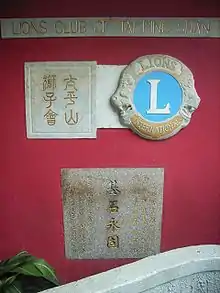
Lions Clubs around the world
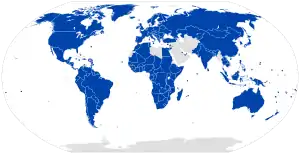

The organization became international on 12 March 1920, when the first club in Canada was established in Windsor, Ontario. In 1937, it was founded in San Juan, Puerto Rico.[24] Lions Clubs have since spread across the globe and have a current membership roster of 1.4 million members worldwide.[25]
Extensions of the Lions family
In addition to adult Lions Clubs, the Lions family includes Lioness Clubs, Leo Clubs, Campus Lions Clubs and Lion Cubs. These divisions are parts of Lions Clubs International.
Lioness Clubs
Lioness Club Membership is generally for women, with exceptions of men also becoming Lioness members nowadays. They are formed under a parent Lions Club. The Lions Club thus becomes the Parent Club for the Lioness Club. Naming of the Club is also like that of the Lions Club—e.g., Lions Club of Satara United Dist 323D-1 forming and sponsoring a Lioness Club Satara United District 323D-1. In many areas, particularly the United States, Lioness clubs have disbanded and merged into their parent clubs to make a more effective club as a whole.
Leo Clubs
Leo Clubs are an extension of the Lions service organization which aims to encourage community service and involvement from a young age. Much like Lioness Clubs, Leo Clubs are sponsored by a parent Lions Club. Leo Clubs are a common school-based organization with members between the ages of 12 and 18 from the same school, these are commonly referred to as Alpha Leo Clubs. Community based clubs also exist; these generally cater for 18- to 30-year-olds, and are referred to as Omega Leo Clubs. Leo Clubs are required to have a Leo Club Advisor, a member of the sponsoring Lions Club who attends meetings and provides general advice to the club. Lions International includes more than 250,000 Leo club members in over 150 countries.[26]
Campus Lions Clubs
Many Leos join a Campus Lions Club if they attend a university or college after high school graduation. There are more than 600 Campus Lions clubs in the world including nearly 13,000 members on college and university campuses in Australia, Brazil, Canada, China, Dominican Republic, Ecuador, El Salvador, England, Ethiopia, Germany, India, Indonesia, Italy, Mongolia, Nepal, Nigeria, Norway, Pakistan, Panama, Peru, Philippines, Russia, Sri Lanka, Thailand, Uganda, United States, Venezuela, Kenya, Zimbabwe, Legion Lions Club in University of Ghana, KNUST Campus Lions and the University of KwaZulu-Natal Campus Lions Club which is the only active Campus Lions Club currently operating in the Republic of South Africa.[27]
Specialty Lions Clubs
These are chartered to focus on a specific need. For instance, Diabetes Clubs, Champion Lions Clubs (Special Olympics), Vision, hearing, homeless/hunger etc. Specialty clubs may also be ethnic based or its members may have similar interests - for instance a gardening Lions Club whose members all have interests in gardening.
Lion Cubs
Lion Cubs is a youth service organization for the elementary aged students (ages eight to twelve).[28] The first club was chartered in the Owen J. Roberts School District in Pottstown, Pennsylvania, United States. It was developed for students in 4th through 6th grade, and therefore too young to be a Leo Club member. The clubs (one club in each of five elementary schools) started their meetings and activities in September 2008 and were officially chartered March 24, 2009. The club is sponsored by the Coventry Lions Club of District 14P. The Lion Cubs first year (2008–09) had 179 charter members.[29]
International convention
An international convention is held annually in cities across the globe for members to meet other Lions, elect the coming year's officers, and partake in the many activities planned. At the convention, Lions can participate in elections and parades, display and discuss fundraisers and service projects, and trade pins and other souvenirs. The first convention was held in 1917, the first year of the club's existence, in Dallas, Texas. The 2006 convention was due to be held in New Orleans, but damage sustained during Hurricane Katrina meant that the convention had to be relocated to Boston.[30]
Conspiracy theories
Indonesian Islamic hardliners have called for a ban on the Lions Club, saying it is part of a Zionist conspiracy. The club has been called an "infidel" front for Freemasonry and the world Zionist movement and threatened Islam in the world's most populous Muslim country.[31]
Given that many Freemasons are members of Lions Clubs, and its founder, Melvin Jones, was also a Freemason,[32] modern conspiracy theories have claimed that the Lions are connected to and act cohesively with Freemasonry. One example is found on Martha F. Lee's Conspiracy Rising: Conspiracy Thinking and American Public Life. It says that the "Freemasons are apparently in cahoots with the Lions Clubs and involved in plots ranging from the distribution of aspartame to control the human mind, to the death of John Paul I, to an apparent plot to spread Zionism."[33]
This perception, according to a Freemasonry website, can be traced to John Robison and the Abbé Barruel's unfounded writings on the causes of the French Revolution, Léo Taxil's late 19th-century hoax and the Protocols of the Elders of Zion.
While there is no direct link between the Lions and the Masons, they are compatible and may have overlapping membership, as evidenced by a speech delivered in 2004 to a Lions Club by a Mason named James F. Kirk-White.[34] The topic of the talk was "Sharing Freemasonry Within Your Community". Their compatibility, moreover, is evidenced by the Masons in Albion, New York offering space for the Lions at a Masonic Lodge.[35] Others also believe that the Lions Clubs actually are a "secret society" that has a great deal of secret ritual within its structure.[36] According to them the Lions are one of those social groups belonging to a secret society that demand an oath of allegiance to join.[37]
Controversial German author Jan Udo Holey, often known by his penname Jan van Helsing, wrote in his 1995 book Geheimgesellschaften und ihre Macht im 20. Jahrhundert (Secret Societies and Their Power in the 20th Century) that the Lions was founded by the B'nai B'rith in Chicago in 1917 and that, like the Freemasons and other secret societies, 90% of its members are used by the elites and have no inkling of what happens in the upper echelons. Holey explained that the lower degrees of the hierarchy of these organizations are much into social work and present good programs.[38]
References
- Timeline. Lions Clubs International
- "Fact Sheet" (PDF). Lions Clubs International. Lions Clubs International. Retrieved September 12, 2019.
- "The Fellowship of William Perry Woods". William-perry-woods-md.com. Archived from the original on December 15, 2017. Retrieved December 25, 2018.
- "Leadership Development Programs". Archived from the original on September 10, 2007. Retrieved November 6, 2007.
- "Association Name and Symbol". Lions Clubs. June 7, 1917. Archived from the original on September 24, 2018. Retrieved October 17, 2016.
- "Lions share flower carpet riches". BBC News. August 25, 2005. Retrieved June 7, 2007.
- "Scheme not bottling out of aid". BBC News. January 31, 2006. Retrieved June 7, 2007.
- "In the News: Lions and LCIF Provide Relief in Philippines from Around the World : The Lions Blog". Lionsclubs.org. November 26, 2013. Archived from the original on March 4, 2016. Retrieved October 17, 2016.
- "Webcast fights blindness". BBC News. October 13, 1999. Retrieved June 7, 2007.
- "About The Institute". Ear Science Institute Australia. Archived from the original on November 4, 2006. Retrieved June 23, 2007.
- "LCIF Grants & Programs". Archived from the original on November 2, 2007. Retrieved November 6, 2007.
- "Case Study: Lions Club International Foundation". Financial Times. July 5, 2007. Retrieved November 3, 2007.
- "Lion Cubs". Coventry Lions. Archived from the original on April 10, 2014. Retrieved March 24, 2013.
- Bill & Melinda Gates Foundation (January 30, 2012). "Private and Public Partners Unite to Combat 10 Neglected Tropical Diseases by 2020". gatesfoundation.org. Press Room, Bill & Melinda Gates Foundation. Archived from the original on March 14, 2013. Retrieved May 30, 2013.
- Uniting to Combat NTDs (2012). "Endorsements (endorsing organizations)". unitingtocombatntds.org. Uniting to Combat Neglected Tropical Diseases. Archived from the original on May 25, 2013. Retrieved May 30, 2013.
- "Women in Lions". November 29, 2009. Archived from the original on January 12, 2013.
- "Club members quit when female joins". BBC News. May 23, 2003. Retrieved November 29, 2009.
- Press Release Archived February 4, 2016, at the Wayback Machine. Lions Clubs International (2014-05-16)
- "Stories and history | Lions Clubs International". Lionsclubs.co. Archived from the original on February 3, 2016. Retrieved October 17, 2016.
- "History of Lions Clubs International". Lions Clubs International. Retrieved February 25, 2017.
- Martin, Paul; Kleinfelder, Robert (2008). Lions Clubs in the 21st Century. Author House. p. 137. ISBN 978-1452063379. Retrieved January 11, 2018.
- "Lions Club Presidents". Lions Club of Savannah. Archived from the original on February 1, 2016. Retrieved October 17, 2016.
- Auszeichnungen – Lions Club International, Homepage des Multidistrikts 111 Deutschland
- Puerto Rico. Office of Historian (1949). Tesauro de datos historicos: indice compendioso de la literatura histórica de Puerto Rico, incluyendo algunos datos inéditos, periodísticos y cartográficos (in Spanish). Impr. del Gobierno de Puerto Rico. p. 153. Retrieved January 4, 2020.
- "PR799 EN Fact Sheet" (PDF). May 7, 2013. Archived from the original (PDF) on July 4, 2014. Retrieved April 8, 2014.
- "Leo Clubs". Archived from the original on February 27, 2010. Retrieved March 19, 2010.
- "Campus Lions Clubs News". Archived from the original on January 3, 2007. Retrieved November 6, 2007.
- "Coventry Lions Cubs Roar with Pride". Coventrylions.org. July 15, 2015. Archived from the original on July 16, 2015. Retrieved October 17, 2016.
- "Coventry Lion Cubs Roar with Pride". Coventrylions.org. February 16, 2013. Archived from the original on April 10, 2014. Retrieved October 17, 2016.
- Yoder, Glenn (March 5, 2006). "Lions will be roaring into town". The Boston Globe. Retrieved June 7, 2007.
- Denis., MacShane (2009). Globalising hatred : the new antisemitism. London: Phoenix. ISBN 9780753823095. OCLC 403445658.
- Melvin Jones Archived March 20, 2014, at the Wayback Machine, Grand Lodge of British Columbia and Yukon
- Martha F Lee, Conspiracy Rising: Conspiracy Thinking and American Public Life, Praeger, 2011, p 22, ISBN 9780313350139
- "Sharing Freemasonry Within Your Community". Address of R.W. Bro. James F. Kirk-White On His Official Visit to Muskoka Lodge. March 2, 2004. Archived from the original on May 22, 2013. Retrieved March 17, 2014.
- "Archived copy". Archived from the original on May 10, 2012. Retrieved May 30, 2014.CS1 maint: archived copy as title (link)
- Adam Parfrey (April 6, 2012) 7 Fascinating Secret Society Photos, Huffington Post, retrieved April 8, 2014
- Steven Heller (April 26, 2012) The Secret History of Secret Societies, The Atlantic, retrieved April 8, 2014
- "Secret Societies and Their Power in The 20th Century - 9". Bibliotecapleyades.net. Archived from the original on February 2, 2016. Retrieved October 17, 2016.